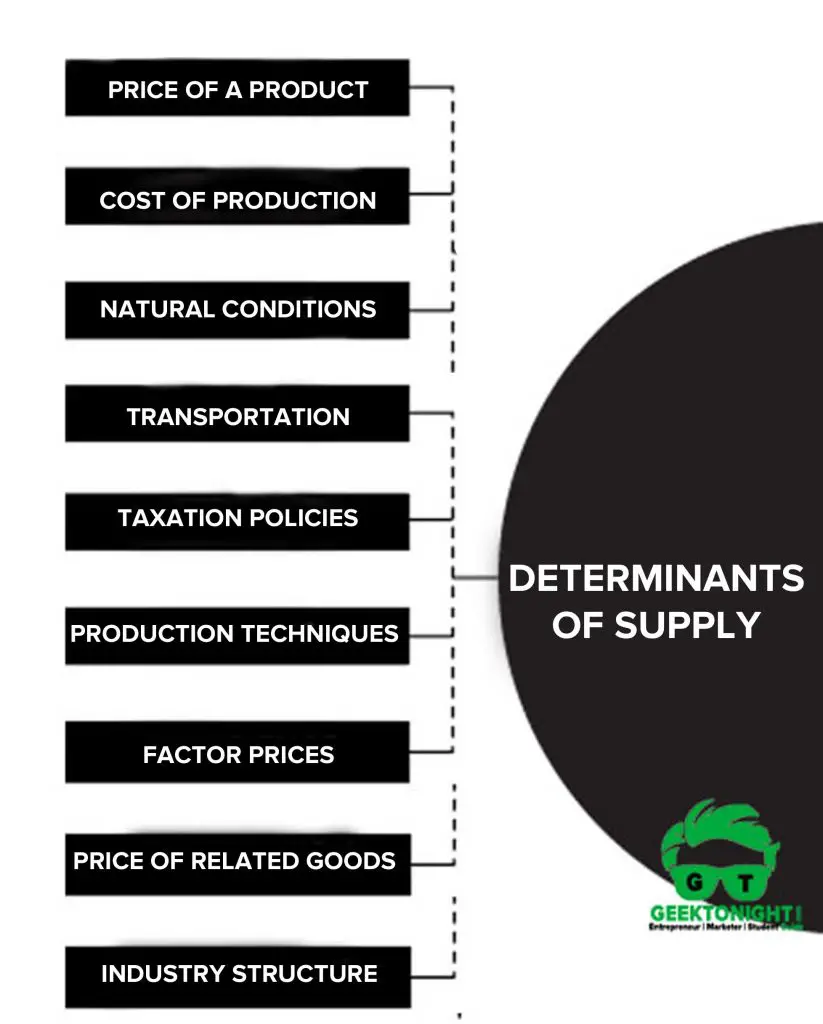Determinants of Supply are the factors that influence producer supply cause the market supply curve to shift.
Table of Content
What is Determinants of Supply?
Supply does not remain constant all the time in the market. There are many factors that influence the supply of a product. Generally, the supply of a product depends on its price and cost of production.
Thus, it can be said that supply is the function of price and cost of production. These factors that influence the supply are called the determinants of supply.
Also Read: What is Supply?
Determinants of Supply
What drives supply? In economics, there are 9 determinants of supply discussed below:
9 Determinants of supply are:
- Price of a product
- Cost of production
- Natural conditions
- Transportation conditions
- Taxation policies
- Production techniques
- Factor prices and their availability
- Price of related goods
- Industry structure

Price of a product
The major determinants of the supply of a product is its price. An increase in the price of a product increases its supply and vice versa while other factors remain the same.
Producers increase the supply of the product at higher prices due to the expectation of receiving increased profits. Thus, price and supply have a direct relationship.
Cost of production
It is the cost incurred on the manufacturing of goods that are to be offered to consumers. Cost of production and supply are inversely proportional to each other.
This implies that suppliers do not supply products in the market when the cost of manufacturing is more than their market price. In this case, sellers would wait for a rise in price in the future.
The cost of production increases due to several factors, such as loss of fertility of land; high wage rates of labour; and increase in the prices of raw material, transportation cost, and tax rate.
Natural conditions
The supply of certain products is directly influenced by climatic conditions. For instance, the supply of agricultural products increases when the monsoon comes well on time.
On the contrary, the supply of these products decreases at the time of drought. Some of the crops are climate specific and their growth purely depends on climatic conditions.
For example, Kharif crops are well grown at the time of summer, while Rabi crops are produced well in the winter season.
Transportation conditions
Better transport facilities result in an increase in the supply of goods. Transport is always a constraint to the supply of goods. This is because goods are not available on time due to poor transport facilities.
Therefore, even if the price of a product increases, the supply would not increase.
Taxation policies
Government’s tax policies also act as a regulating force in supply. If the rates of taxes levied on goods are high, the supply will decrease. This is because high tax rates increase overall productions costs, which will make it difficult for suppliers to offer products in the market.
Similarly, reduction in taxes on goods will lead to an increase in their supply in the market.
Production techniques
The supply of goods also depends on the type of techniques used for production. Obsolete techniques result in low production, which further decreases the supply of goods.
Over the years, there has been tremendous improvement in production techniques, which has led to increase in the supply of goods.
Factor prices and their availability
The production of goods is dependent on the factors of production, such as raw material, machines and equipment, and labour.
An increase in the prices of the factors of production increases the cost of production. This will make difficult for firms to supply large quantities in the market.
The prices of substitutes and complementary goods also influence the supply of a product to a large extent.
For example, if the price of tea increases, farmers would tend to grow more tea than coffee. This would decrease the supply of tea in the market.
Industry structure
The supply of goods is also dependent on the structure of the industry in which a firm is operating. If there is monopoly in the industry, the manufacturer may restrict the supply of his/her goods with an aim to raise the prices of goods and increase profits.
On the other hand, in case of a perfectly competitive market structure, there would be a large of number of sellers in the market. Consequently, the supply of a product would increase.
Also Read: Law of Supply
Business Economics Tutorial
(Click on Topic to Read)
Go On, Share article with Friends
Did we miss something in Business Economics Tutorial? Come on! Tell us what you think about our article on Determinants of Supply | Business Economics in the comments section.
Business Economics Tutorial
(Click on Topic to Read)










